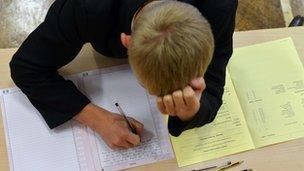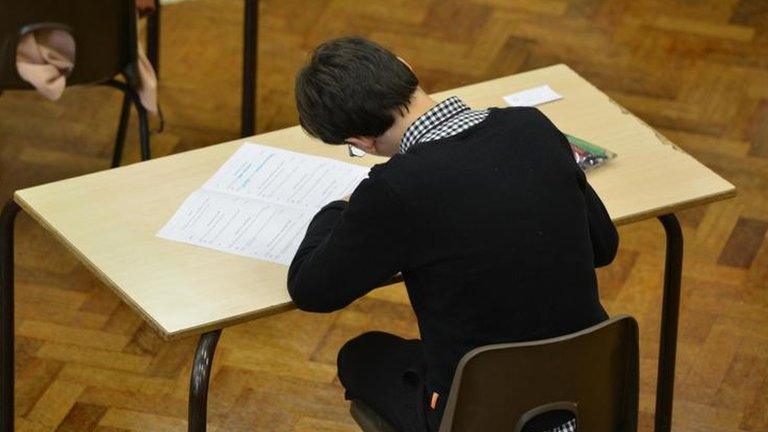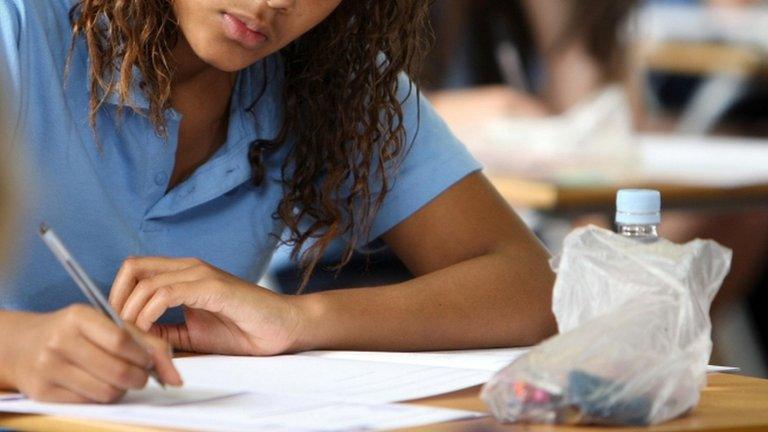'Lack of confidence' in GCSE grades
- Published

Ministers are in the process of overhauling exams
Many teachers, heads and parents lack confidence in GCSE grades, research into perceptions of secondary school exams in England suggests.
A detailed survey of 4,686 people for exams regulator Ofqual suggests fewer than two-thirds felt that at least 75% of GCSE students were graded correctly.
Overall faith in GCSE exams appears to have been significantly affected by last year's English GCSE grading row.
Ofqual said it wanted to see confidence in GCSEs return.
The regulator's annual survey; Perceptions of A-levels, GCSEs and other qualifications,, external suggested four out of five head teachers and two-thirds of teachers have had their confidence knocked by the grading controversy.
GCSE shake-up
English teachers' confidence was particularly badly hit with 94% reporting being affected "a lot" or a "fair amount" by the problems.
And public confidence in the exams has also been adversely affected.
The row broke out after grade boundaries were changed by the exam boards at the eleventh hour leaving pupils who had sat the exam at different times of the year with different grades for the same mark.
This was motivated, according to Ofqual, by a need to maintain standards and fairness over time.
Ministers are in the process of overhauling GCSEs with a switch to exams being taken at the end of two years rather than in stages, fewer re-sits and a reduced role for coursework.
But they shelved plans to scrap them in favour of a new qualification which was to be known as the English Baccalaureate.
'Real challenges'
The chief regulator Glenys Stacey said the survey was about perceptions and it was important to know what concerns people had.
"We want to see confidence in GCSEs return as they become more robust and assessment is seen to be, and is, fair and accurate.
"I think there is an appetite for change and improvement. We have an opportunity with the reform of GCSEs and A-levels to develop new - or strengthen existing - high quality qualifications that are stimulating to teach and worthwhile to study.
"While the survey does highlight some real challenges, there are reasons to be optimistic that we can make improvements and achieve robust and valued qualifications and assessments."
'Fundamental reform'
The survey, however, highlighted strong feelings from professionals and the public alike about the value and importance of students gaining an A-level qualification.
A large majority of heads and teachers (75% and 78% respectively) thought that all or at least two-thirds received the right grade. Confidence was less pronounced among the general public.
A Department for Education spokesman said Secretary of State Michael Gove warned when he came to office that the GCSE system had serious weaknesses and needed fundamental reform.
"This report shows that these concerns are widespread. The changes we are making will restore confidence in GCSEs - scrapping the modular approach, which led to last year's grading problems, and most coursework.
"New GCSEs will be introduced from 2015 - they will be more rigorous, with deeper subject content and match the best equivalent exams in the world.
"We are also making changes to A levels, also from 2015 - these will address the concerns of academics in our top universities."
The survey was carried out between November 2012 and January 2013 and involved a range of face-to-face and phone interviews with 3,213 members of the public, 254 students who have been sitting the exams in question, 416 parents and carers of students, 600 teachers and 203 head teachers.
'Fiasco'
Brian Lightman, general secretary of Association of the School and College Leaders, said: "In light of the problems with English last year it is understandable that confidence in GCSEs has dropped.
"The lack of confidence was about the way the exams were marked, not about modular exams or GCSE as a qualification.
"In no way does it justify claims by policy makers that GCSE is not fit for purpose. What is needed is stability rather than the constant changes we have had that only undermine confidence further."
National Union of Teachers general secretary Christine Blower said: "It is hardly surprising that last year's GCSE marking fiasco caused concerns. An estimated 10,000 students who took their English GCSE exam in June 2012 missed out on a C grade as a result of decisions by the examination boards.
"These students achieved exactly the same standard as their classmates who had been awarded a C grade just a few months earlier. It is very clear to the NUT that a great injustice has been done. The Education Secretary should have taken the lead from Wales and ordered the re-grading of those affected."
- Published7 February 2013
- Published7 February 2013

- Published13 February 2013
